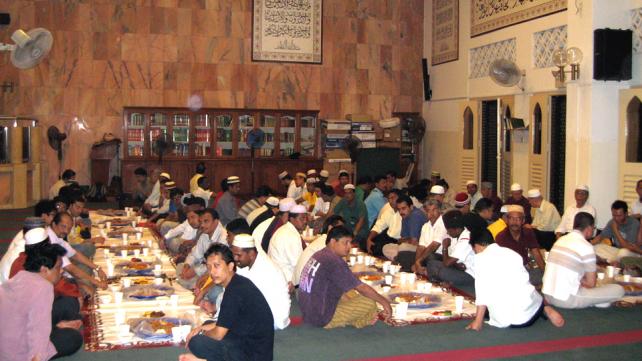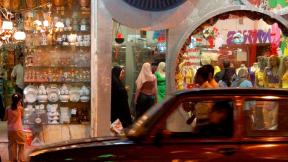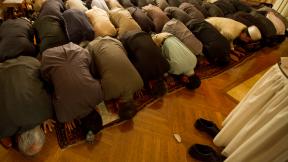
The Obligation
Fasting in Islam is one of the five pillars of Islam. It is an act of obedience and submission to Allah's commands through the highest degree of commitment, sincerity and faithfulness to seek Allah's mercy, to atone for sins, errors, and mistakes and to avoid condemnation to Hell.
It is done out of deep love for God, with a genuine virtue of devotion, honest dedication and closeness to Allah, for Fasting is for Allah and Him alone.
The fasting during Ramadan is obligatory on every adult, sane, and able Muslim.
Denial of the obligatory nature of fasting in the month of Ramadan amounts to disbelief.
One who avoids fasting without genuine reasons is a sinner and transgressor according to Islamic law.
Time: When to fast
Fasting in Islam involves abstinence from three primal physical needs of human beings- food, drink, and sexual intercourse from dawn (approximately one and a half hours before sunrise) to sunset during the entire month of Ramadan.
Who is exempted from fasting in Islam
1. Children under the age of puberty and discretion;
2. The insane people who are unaccountable for their deeds. People of these two categories are exempted from the duty of fasting and no compensation or any other substitute is enjoined on them;
3. Men and women who are too old and feeble to undertake the obligation of fasting and bear its hardships. Such people are exempted from this duty, but they must offer at least one needy poor Muslim an average full meal or its value per person day.
4. Sick people whose health is likely to be severely affected by fasting. They may postpone the fast, as long as they are sick, to a later date and makeup for it, a day for a day;
5. People expecting hardship. Such people may break the fast temporarily during their travel only and make up for it in later days, a day for a day. But it is better for them, the Quran says, to keep the fast if they can without causing extraordinary hardships;
6. Expectant women and women nursing their children may also break the fast, if its observance is likely to endanger their own health or that of their infants. But they must make up for the fast at a delayed time, a day for a day;
7. Women in periods of menstruation (of a maximum of ten days). They must postpone the fast till recovery and then make up for it, a day for day.
The How To's of Fasting in Islam
Niyyah or Intention of Fast
To observe the fast, the intention of fasting is essential (Wajib). The intention should be made daily, preferably before dawn of each day of fasting (in Ramadan).
Provision is made if someone has forgotten to express his intention before dawn. In such a case one is allowed to express intention of fasting before noon to avoid the invalidation of the fast.
The wording of Niyyah may be as follows:
"I intend to observe fast for today."
Suhoor
Suhoor is a light, predawn meal, recommended before actually fasting.?It is a blessing and hence recommended but not essential.?
Any consumption of food or drink should cease at least five to ten minutes before the onset of dawn.
Iftar
Iftar is an Arabic term meaning breaking the fast immediately after the sunset.?Iftar is a light snack consisting of dates or desserts, along with liquids, such as water, juice or milk.?
This is eaten after making the following Dua (supplication) for breaking the fast:
"Oh Allah!? I fasted for your sake and I am breaking my fast from the sustenance You blessed me with, accept it from me."
What breaks the fast
1. Intentional consumption of food, drink, medicine, or smoking during the fasting.
2. Any injection which has some nutritional value.
3. Beginning of menstruation or post natal birth bleeding (even in the last moment of sunset).
The conditions mentioned above invalidate fasting and require "Qada" (making up only the missed day or days).?However, intentional intercourse during the hours of fasting invalidates fasting and not only requires "Qada" but also additional penalty (Kaffara-see the explanation of this below).
What does not break the fast
1. Eating or drinking by mistake, unmindful of the fast.
2. Unintentional vomiting.
3. Swallowing things which are not possible to avoid, such as one's own saliva, street dust, smoke, etc.
4. Brushing the teeth.
5. Bathing: if water is swallowed unintentionally, it does not invalidate the fast.?However, while fasting gargling should be avoided.
6. Injection or I/V (Intravenous) which is solely medicinal and not nutritional.
7. In some special circumstances if the food or drink is just tasted and immediately removed out of the mouth without allowing it to enter into the throat.
Kaffara
During the fasting period, if one deliberately breaks his or her fast, s/he must free one slave, or fast for sixty continuous days, or feed sixty needy persons, or spend in charity an amount equal to feeding sixty persons.?
If one chooses to fast sixty days and the continuity is interrupted for any reason, except menstruation, one has to start the sixty day cycle all over again.
Breaking of the fast under exceptional conditions
Muslims are permitted to break their fast of Ramadan when there is a danger to their health.?
In this situation a Muslim should make up his/her fast later.?The missed fast(s) can be made up at any other time of the year, either continuously or intermittently, except on the day of Eid-ul-Fitr and the day of Eid-ul-Adha
Tarawih
These are special Sunnah prayers in the month of Ramadan.?They follow the Isha prayers.? A minimum of eight and a maximum of twenty Rakat are offered in pairs of two.
Lailat al-Qadr
Amongst the nights of Ramadan, there is one special night of Power (Qadr) which is highlighted in Surah al-Qadr (Surah 97 in the Quran).?
It has the significance of being better than a thousand months (Quran 97:3).?
This was the night when Quran was revealed to mankind.?Prophet Muhammad (peace and blessings be upon him) recommended Muslims search for this night of Power (Qadr) in the odd nights of the last ten nights in Ramadan.
Muslims spend the night in Ibadah (worship), asking forgiveness of their sins and reciting the Quran.








Comments
i would like to knw if i can fast. iam getting a sppoting bt not actual bleeding....after breakin my fast i observed bt nw when i checked there is no bleeding as such....iam confused shall i continue fasting or not
Location
Yes, probably
I think you should try and if it starts again while your fasting, just redo that day! You might as well try before saying you can't!
Location
very helpful, clear and concise information
Location
i'm delighted having access to instant answers to issues concerning ramadan fast. You are doing a great job. May Allah bless you all. Salam Alaikum
Location
Salaam,this is a very educative piece about Ramadan,a well explained matters that are recommended in the month of Ramadan.May Allah Reward you and make us witness the the entire month in good health and blessing from Allah(SWT).Jazakallah.
Location
May Allah accept your efforts. While most of what you wrote is a remainder, i leant one new thing about Tarawih.You see, usually i used to offer only six raka at thinking that is the minimum but now i understand that it is eight. thanks alot.
Location
Fasting in Ramadan means to stop yourself from food as ALLAH said. This is a training for Muslims to stop the things ALLAH wants to be. Be in the boundaries of Islam and obey ALLAH.
Location
excellent clear information jazakallah
Location
very beautiful information for Ramadan
Location
good information
Location
Pages
Add new comment